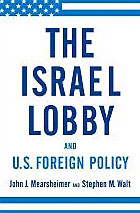Institute for Middle East Understanding 6 September 2007

Needless to say, Mearsheimer, the R. Wendell Harrison Distinguished Service Professor of Political Science and the co-director of the Program on International Security Policy at the University of Chicago, and Walt, the Robert and Renee Belfer Professor of International Affairs at the John F. Kennedy School of Government at Harvard University and former academic dean of the Kennedy School, did not suddenly lose their intellectual acumen in penning this well-reasoned criticism of the Israel lobby. Nor did the two expose themselves as anti-Semites as some critics have unfairly suggested.
Indeed, perhaps the most powerful section of the book is when the authors highlight cases in which significant parts of the lobby have leveled the anti-Semitism charge at individuals guilty of nothing more than challenging the human rights record of Israel. Due to such overuse, they write, “There are signs that the reflexive charge of anti-Semitism is beginning to lose its power to stifle debate.” (195) Nevertheless, they rightly note that “If politicians know that it is risky to question Israeli policy or the United States’ unyielding support for Israel, then it will be harder for the mainstream media to locate authoritative voices that are willing to disagree with the lobby’s views.” (196) Intimidation and ugly slanders work. This book does much to expose the unsavory practice and is intended to open space for substantive discussion regarding Israel and the lobby that reflexively backs it, right or wrong.
Mearsheimer and Walt devote the early chapters of the book to dismantling the strategic and moral arguments commonly made on Israel’s behalf. The two realists are perhaps most convincing on the moral front when they challenge the common narrative of little Israel fending off ruthless Arab states. “A good case can be made that current US policy conflicts with basic American values and that if the United States were to choose sides on the basis of moral considerations alone, it would back the Palestinians, not Israel.” (80) To wit, they challenge the notion of shared common values by citing authoritative polls indicating that “55 percent of Israeli Jews wanted segregated entertainment facilities, while more than 75 percent said they would not live in the same building as an Israeli Arab.” (88) This is Israel in 2007 and not the Jim Crow South of 1950. Such discriminatory beliefs translated into law, they maintain “are not consistent with America’s image of a multi-ethnic democracy in which all citizens are supposed to be treated equally regardless of their ancestry.” (89)
With The Israel Lobby being released in the very month that State Department official Patrick Syring was exposed for having telephoned the Arab American Institute in 2006 and declared, “The only good Arab is a dead Arab,” it is disquieting to see that IDF Chief of Staff Rafael Eitan has said much the same. (89) Such open racism generally ends careers in the United States. In Israel, as the authors illustrate, such views are all-too-frequently held at the highest level of government.
Strategically, US government action abetting the subjugation of the Palestinians has caused our country enormous harm. “Today, America’s intimate embrace of Israel — and especially its willingness to subsidize it no matter what its policies are — is not making Americans safer or more prosperous. To the contrary: unconditional support for Israel is undermining relations with other US allies, casting doubt on America’s wisdom and moral vision, helping inspire a generation of anti-American extremists, and complicating US efforts to deal with a volatile but vital region.” (77)
But what is the Israel lobby and how does it work? Mearsheimer and Walt define the lobby as a “shorthand term for the loose coalition of individuals and organizations that actively work to shape US foreign policy in a pro-Israel direction.” (112) Some of the most important organizations in the lobby — such as the American Israel Public Affairs Committee (AIPAC) and the Conference of Presidents of Major American Jewish Organizations — have moved to the right in recent years. They are out of step with the majority of Jews in the United States who are generally liberal and supportive of a two-state outcome. (126) “Groups in the lobby employed a variety of tactics: open letters, congressional resolutions, op-eds and press releases, and direct meetings between administration officials and the leaders of influential Jewish and evangelical groups” to stymie executive branch initiatives intended to bring pressure against Israel in the effort to advance a two-state solution. (228)
The authors cite repeated examples of the lobby undercutting the Bush administration when it displayed the slightest willingness to press Israel to respect Palestinian rights and aspirations. They stress that there is nothing illegal in the work of the pro-Israel lobby — the lobby is simply better at it than would-be opponents. They do, however, cite the expected trial later this year of former AIPAC employees Steven Rosen and Keith Weissman as well as the case from the 1980s and early 1990s of the Anti-Defamation League (ADL) spying on Arab-American organizations as well as Jewish-American dissidents which was settled with ADL payments but no public admission of wrongdoing. (187) Mearsheimer and Walt repeatedly stress that the lobby is not a cabal or conspiracy (150) and clearly regard such talk, as they should, as anti-Semitic. The lobby’s members believe they are advancing American and Israeli interests, though they are failing on both fronts (112, 199), and “have successfully convinced many Americans that American and Israeli interests are essentially identical” when, quite clearly, “they are not.” (8)
This is a courageous book. The charge of anti-Semitism, even when clearly politicized, is one that undoubtedly will cause them personal pain. Nonetheless, they have proceeded, presumably because they are convinced Americans are increasingly seeing through such false allegations and because the stakes of American missteps in the Middle East — Israel/Palestine, Iraq, Syria, Iran, and Lebanon — are enormous.
Michael F. Brown is a former executive director of Partners for Peace and is currently employed at the Institute for Middle East Understanding.
This article was originally published by the Institute for Middle East Understanding and is republished with permission.
Related Links





